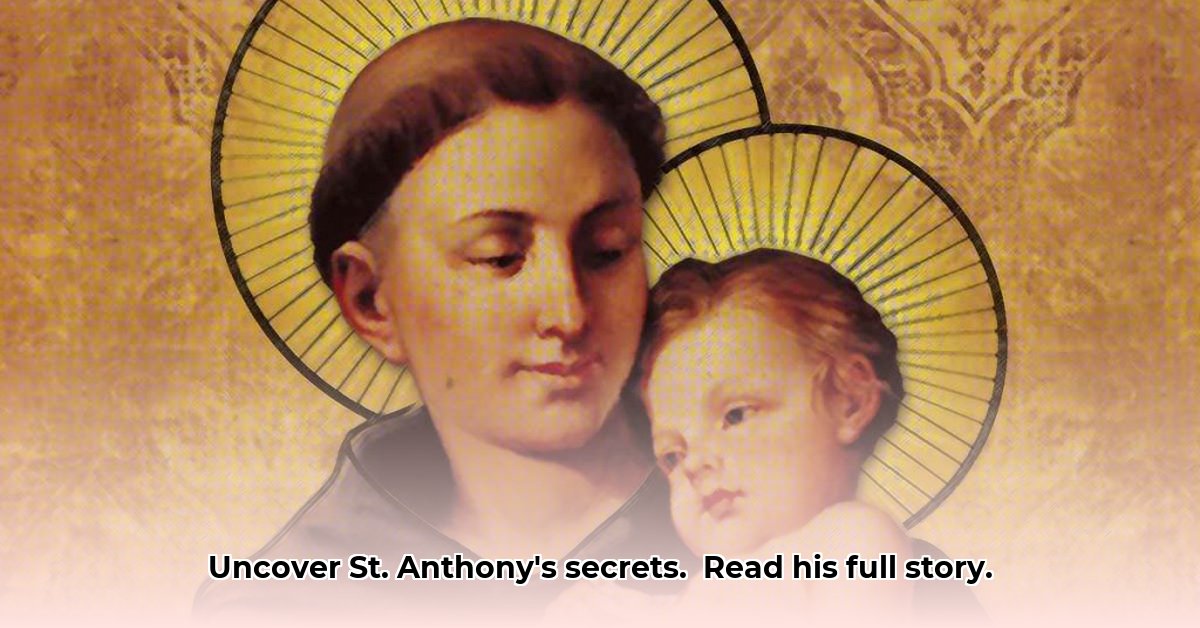St. Anthony of Padua, born Fernando Martins de Bulhões in Lisbon, Portugal around 1195, stands as a beacon of faith and service. His life, a remarkable transformation from an affluent upbringing to a life of poverty and spiritual devotion, continues to resonate centuries later. This comprehensive biography explores the intricate tapestry of St. Anthony’s life, weaving together historical accounts, enduring legends, and the profound impact he had on both the Franciscan Order and the broader religious landscape. For more on the lives of saints, see other saints.
A Path Forged in Faith: From Lisbon to the Franciscan Order
Fernando’s early life was one of privilege, affording him access to a robust education steeped in classical studies. This foundation, while seemingly disparate from his later embrace of poverty, proved instrumental in shaping his theological acumen and intellectual prowess. At the age of 15, he joined the Augustinian Canons Regular of St. Augustine at the Abbey of Santa Cruz in Coimbra, immersing himself in theological studies and Latin. While there, he served as guestmaster, responsible for the abbey’s hospitality, offering early glimpses of his future dedication to serving others. While at Coimbra, he was likely ordained a priest. However, a spiritual yearning stirred within him, prompting a search for deeper meaning and purpose.
The martyrdom of five Franciscan friars in Morocco became a turning point for Fernando. Their unwavering commitment to spreading the Gospel, even unto death, ignited a fire within him. Inspired by their sacrifice, he sought to join the Franciscan Order, drawn to their emphasis on poverty, humility, and service to the marginalized. This decision marked a radical departure from his life of comfort, a testament to the depth of his spiritual awakening. Upon entering the Franciscan Order, he adopted the name Anthony, symbolic of his new identity and unwavering devotion to a life of faith.
The Gift of Eloquence: St. Anthony as the Preacher
Anthony’s initial aspiration to become a missionary was thwarted by illness. During his convalescence, however, a remarkable gift emerged: his talent for preaching. At an ordination gathering in 1222, an unexpected opportunity arose for Anthony to preach. His sermon, delivered with unexpected eloquence and insightful understanding of scripture, captivated the audience. This event marked the beginning of his renowned preaching ministry, which became a cornerstone of his influence. He was appointed to preach throughout northern Italy and later taught Franciscan theology in Bologna, Padua, southern France, and possibly other places. His sermons were not merely recitations of scripture; they were delivered in a manner that resonated deeply with both the learned and the unlettered, making complex theological concepts universally accessible.
St. Anthony’s preaching extended beyond the pulpit. His commitment to living the Gospel message – embracing poverty, demonstrating compassion, and dedicating himself to serving others – became deeply intertwined with his teachings. His actions served as a powerful testament to the authenticity of his words, further amplifying his message. St. Anthony’s popularity as a preacher grew tremendously. Even those resistant to his message, as depicted in the legend of him preaching to the fish, were eventually drawn to his powerful oratory and unwavering faith.
Miracles, Legacy, and the Patron Saint of Lost Things
Numerous miracles are attributed to St. Anthony, both during his lifetime and posthumously. From the miraculous recovery of a drowned child to the compelling story of the exhumed body that identified its murderer, these accounts, whether historically verified or part of the rich tapestry of legend, underscore the profound impact he had on the faithful. These stories, passed down through generations, illustrate the deep reverence and enduring belief in St. Anthony’s intercessory power.
The title of “patron saint of lost things” stems from a legend surrounding the theft of a psalter containing Anthony’s invaluable notes. His prayers for its return were answered, solidifying his association with recovering lost items. This aspect of his legacy, while perhaps the most widely known, represents just one facet of his enduring influence. St. Anthony served as the Provincial Superior of northern Italy. The demands of this leadership role, combined with his rigorous preaching schedule and ascetic practices, took a toll on his health.
St. Anthony’s enduring legacy rests not only on miraculous tales but also on his profound theological contributions, his unwavering commitment to service, and his exceptional preaching abilities. His writings, particularly his “Sermons for Sundays and Feast Days,” continue to inspire and offer guidance to theologians and laypeople alike.
Canonized just a year after his death in 1231, St. Anthony of Padua’s life serves as a testament to the transformative power of faith and the enduring impact of a life dedicated to humility, service, and unwavering devotion to God. He was declared a Doctor of the Church by Pope Pius XII in 1946. His feast day is celebrated annually on June 13th. His image often includes a book, representing his theological knowledge, and the Child Jesus, symbolizing his devotion and the miraculous vision he is said to have experienced.
- Unlock Filipino Culture: A Deep Dive into Traditions and Practices - April 23, 2025
- Unlock Spanish Culture: Insights & Opportunities Now - April 23, 2025
- White Spirit Uses & Substitutes: A Deep Dive for Pros & DIYers - April 23, 2025















